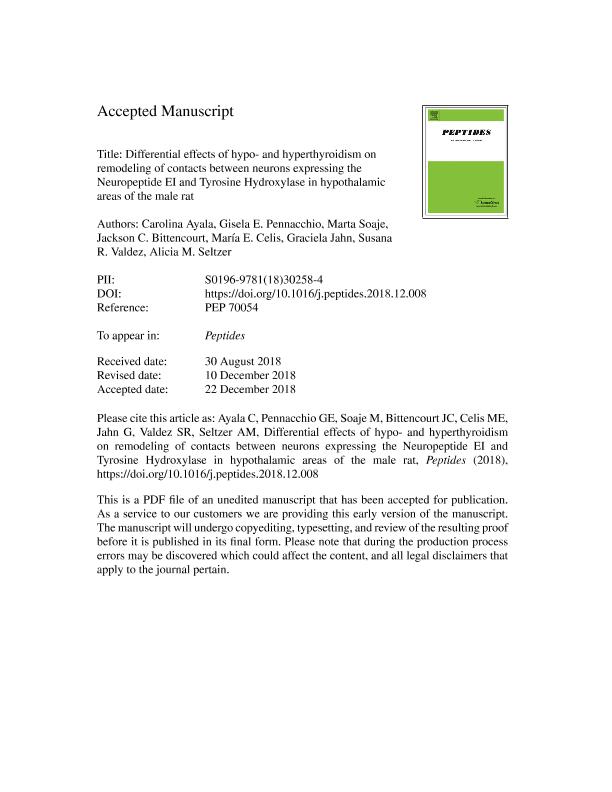Mostrar el registro sencillo del ítem
dc.contributor.author
Ayala, Carolina

dc.contributor.author
Pennacchio, Gisela Erika

dc.contributor.author
Soaje, Marta

dc.contributor.author
Bittencourt Guimaraes, Ana Tereza

dc.contributor.author
Celis, Marìa E.
dc.contributor.author
Jahn, Graciela Alma

dc.contributor.author
Valdez, Susana Ruth

dc.contributor.author
Seltzer, Alicia Mabel

dc.date.available
2019-11-12T17:38:27Z
dc.date.issued
2019-03
dc.identifier.citation
Ayala, Carolina; Pennacchio, Gisela Erika; Soaje, Marta; Bittencourt Guimaraes, Ana Tereza; Celis, Marìa E.; et al.; Differential effects of hypo- and hyperthyroidism on remodeling of contacts between neurons expressing the neuropeptide EI and tyrosine hydroxylase in hypothalamic areas of the male rat; Elsevier Science Inc; Peptides; 113; 3-2019; 1-10
dc.identifier.issn
0196-9781
dc.identifier.uri
http://hdl.handle.net/11336/88647
dc.description.abstract
The Neuropeptide EI (NEI, glutamic acid- isoleucine amide) participates in neuroendocrine function. Previously we demonstrated that NEI concentration is regulated by thyroid hormones in discrete hypothalamic areas in rats. We observed that the thyroid status affects the dopaminergic regulation of the pituitary hormones. In this study we explored possible interactions between NEI and tyrosine hydroxylase (TH) containing elements in selected hypothalamic areas of male rats. Neuronal somas, terminals and boutons were assessed by confocal microscopy, in hypo- and hyperthyroid animals. We observed a remodeling of the contacts between the TH and NEI immunoreactive elements in the incerto-hypothalamic area (IHy, also known as rostromedial zona incerta) according to thyroid function. However, in the dorsolateral zone of the peduncular part of the lateral hypothalamus (DL-PLH) the thyroid hormones affect the dendritic trees of the neurons without perturbing the overall NEI/TH contacts. Also, we demonstrated that TRH Receptor 1 (TRH-R1) is colocalized in NEI immunoreactive neurons in the peduncular part of the lateral hypothalamus (PLH) and NEI precursor mRNA expression increased by hypothyroidism indicating that NEI neurons are responsive to the feedback mechanisms of the Hypothalamic Pituitary-Thyroid Axis (HPT). In conclusion, the hypothyroid status seems to increase the interactions between the NEI neurons and the dopaminergic pathways while hyperthyroidism either decreases or displays no effects. Altogether these observations support the participation of the IHy and PLH NEI as a modulating component of the HPT suggesting that altered neuroendocrine, behavioral and cognitive dysfunctions induced by dysthyroidism could be in part mediated by NEI.
dc.format
application/pdf
dc.language.iso
eng
dc.publisher
Elsevier Science Inc

dc.rights
info:eu-repo/semantics/openAccess
dc.rights.uri
https://creativecommons.org/licenses/by-nc-nd/2.5/ar/
dc.subject
HYPERTHYROID STATUS
dc.subject
HYPOTHALAMUS
dc.subject
HYPOTHYROID STATUS
dc.subject
NEUROPEPTIDE (N) GLUTAMIC ACID (E) ISOLEUCINE (I) AMIDE (NEI)
dc.subject
PEDUNCULAR PART OF THE LATERAL HYPOTHALAMUS (PLH)
dc.subject
ROSTRAL/CAUDAL INCERTO-HYPOTHALAMIC AREA (IHY)
dc.subject
TYROSINE HYDROXYLASE (TH)
dc.subject.classification
Otras Ciencias Médicas

dc.subject.classification
Otras Ciencias Médicas

dc.subject.classification
CIENCIAS MÉDICAS Y DE LA SALUD

dc.title
Differential effects of hypo- and hyperthyroidism on remodeling of contacts between neurons expressing the neuropeptide EI and tyrosine hydroxylase in hypothalamic areas of the male rat
dc.type
info:eu-repo/semantics/article
dc.type
info:ar-repo/semantics/artículo
dc.type
info:eu-repo/semantics/publishedVersion
dc.date.updated
2019-10-21T20:11:02Z
dc.journal.volume
113
dc.journal.pagination
1-10
dc.journal.pais
Estados Unidos

dc.description.fil
Fil: Ayala, Carolina. Consejo Nacional de Investigaciones Científicas y Técnicas. Centro Científico Tecnológico Conicet - Mendoza. Instituto de Histología y Embriología de Mendoza Dr. Mario H. Burgos. Universidad Nacional de Cuyo. Facultad de Ciencias Médicas. Instituto de Histología y Embriología de Mendoza Dr. Mario H. Burgos; Argentina
dc.description.fil
Fil: Pennacchio, Gisela Erika. Consejo Nacional de Investigaciones Científicas y Técnicas. Centro Científico Tecnológico Conicet - Mendoza. Instituto de Medicina y Biología Experimental de Cuyo; Argentina
dc.description.fil
Fil: Soaje, Marta. Consejo Nacional de Investigaciones Científicas y Técnicas. Centro Científico Tecnológico Conicet - Mendoza. Instituto de Medicina y Biología Experimental de Cuyo; Argentina
dc.description.fil
Fil: Bittencourt Guimaraes, Ana Tereza. Instituto de Ciencias Biomedicas; Brasil
dc.description.fil
Fil: Celis, Marìa E.. Universidad Nacional de Cordoba. Facultad de Medicina. Departamento de Medicina. Cat.de Bacteriologia y Virologia Medicas; Argentina
dc.description.fil
Fil: Jahn, Graciela Alma. Consejo Nacional de Investigaciones Científicas y Técnicas. Centro Científico Tecnológico Conicet - Mendoza. Instituto de Medicina y Biología Experimental de Cuyo; Argentina
dc.description.fil
Fil: Valdez, Susana Ruth. Consejo Nacional de Investigaciones Científicas y Técnicas. Centro Científico Tecnológico Conicet - Mendoza. Instituto de Medicina y Biología Experimental de Cuyo; Argentina
dc.description.fil
Fil: Seltzer, Alicia Mabel. Consejo Nacional de Investigaciones Científicas y Técnicas. Centro Científico Tecnológico Conicet - Mendoza. Instituto de Histología y Embriología de Mendoza Dr. Mario H. Burgos. Universidad Nacional de Cuyo. Facultad de Ciencias Médicas. Instituto de Histología y Embriología de Mendoza Dr. Mario H. Burgos; Argentina
dc.journal.title
Peptides

dc.relation.alternativeid
info:eu-repo/semantics/altIdentifier/doi/https://doi.org/10.1016/j.peptides.2018.12.008
dc.relation.alternativeid
info:eu-repo/semantics/altIdentifier/url/https://www.sciencedirect.com/science/article/pii/S0196978118302584
Archivos asociados
